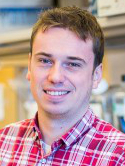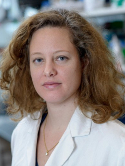CDC7 inhibition impairs neuroendocrine transformation in lung and prostate tumors through MYC degradation Journal Article
| Authors: | Quintanal-Villalonga, A.; Kawasaki, K.; Redin, E.; Uddin, F.; Rakhade, S.; Durani, V.; Sabet, A.; Shafer, M.; Karthaus, W. R.; Zaidi, S.; Zhan, Y. A.; Manoj, P.; Sridhar, H.; Kinyua, D.; Zhong, H.; Mello, B. P.; Ciampricotti, M.; Bhanot, U. K.; Linkov, I.; Qiu, J.; Patel, R. A.; Morrissey, C.; Mehta, S.; Barnes, J.; Haffner, M. C.; Socci, N. D.; Koche, R. P.; de Stanchina, E.; Molina-Pinelo, S.; Salehi, S.; Yu, H. A.; Chan, J. M.; Rudin, C. M. |
| Article Title: | CDC7 inhibition impairs neuroendocrine transformation in lung and prostate tumors through MYC degradation |
| Abstract: | Neuroendocrine (NE) transformation is a mechanism of resistance to targeted therapy in lung and prostate adenocarcinomas leading to poor prognosis. Up to date, even if patients at high risk of transformation can be identified by the occurrence of Tumor Protein P53 (TP53) and Retinoblastoma Transcriptional Corepressor 1 (RB1) mutations in their tumors, no therapeutic strategies are available to prevent or delay histological transformation. Upregulation of the cell cycle kinase Cell Division Cycle 7 (CDC7) occurred in tumors during the initial steps of NE transformation, already after TP53/RB1 co-inactivation, leading to induced sensitivity to the CDC7 inhibitor simurosertib. CDC7 inhibition suppressed NE transdifferentiation and extended response to targeted therapy in in vivo models of NE transformation by inducing the proteasome-mediated degradation of the MYC Proto-Oncogen (MYC), implicated in stemness and histological transformation. Ectopic overexpression of a degradation-resistant MYC isoform reestablished the NE transformation phenotype observed on targeted therapy, even in the presence of simurosertib. CDC7 inhibition also markedly extended response to standard cytotoxics (cisplatin, irinotecan) in lung and prostate small cell carcinoma models. These results nominate CDC7 inhibition as a therapeutic strategy to constrain lineage plasticity, as well as to effectively treat NE tumors de novo or after transformation. As simurosertib clinical efficacy trials are ongoing, this concept could be readily translated for patients at risk of transformation. © The Author(s) 2024. |
| Keywords: | cancer chemotherapy; controlled study; human tissue; protein expression; unclassified drug; gene mutation; human cell; genetics; cancer recurrence; cisplatin; cancer staging; flow cytometry; dna replication; cell proliferation; cell cycle protein; mouse; phenotype; animal; metabolism; animals; cell cycle proteins; mice; dna damage; gene overexpression; apoptosis; proteasome; gene expression; ubiquitin protein ligase; protein degradation; lung neoplasms; tumor xenograft; drug effect; pathology; cell line, tumor; protein serine threonine kinase; protein p53; genetic transduction; cell transformation, neoplastic; neuroendocrine tumor; prostate cancer; prostatic neoplasms; lung tumor; tumor suppressor gene; messenger rna; myc protein; prostate tumor; tumor cell line; immunoprecipitation; plasmid; lentivirus vector; immunoblotting; tumor suppressor protein p53; cell cycle checkpoint; fluorescence microscopy; upregulation; cell transdifferentiation; drug therapy; computer model; bioinformatics; myc protein, human; tp53 protein, human; proto-oncogene proteins c-myc; ubiquitin-protein ligases; rna extraction; neuroendocrine tumors; chromatin structure; small cell carcinoma; circulating tumor cell; synaptophysin; cytotoxicity assay; colony formation; retinoblastoma binding protein; proteolysis; notch signaling; enzalutamide; humans; human; male; article; cell viability assay; crispr-cas9 system; neuroendocrine transformation; protein serine-threonine kinases; rb1 protein, human; retinoblastoma binding proteins; neoplastic cell transformation; cell cycle kinase cell division cycle 7; retinoblastoma transcriptional corepressor 1; simurosertib; cdc7 protein, human; virus production |
| Journal Title: | Signal Transduction and Targeted Therapy |
| Volume: | 9 |
| ISSN: | 2095-9907 |
| Publisher: | Springer Nature |
| Date Published: | 2024-01-01 |
| Start Page: | 189 |
| Language: | English |
| DOI: | 10.1038/s41392-024-01908-y |
| PUBMED: | 39054323 |
| PROVIDER: | scopus |
| PMCID: | PMC11272780 |
| DOI/URL: | |
| Notes: | The MSK Cancer Center Support Grant (P30 CA008748) is acknowledged in the PDF. Corresponding MSK authors are Alvaro Quintanal-Villalonga and Charles M. Rudin -- Source: Scopus |
Altmetric
Citation Impact
BMJ Impact Analytics
MSK Authors
Related MSK Work



























